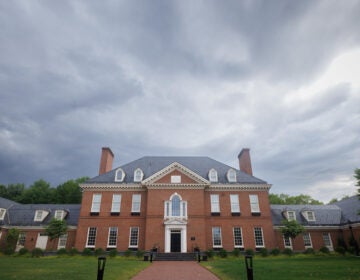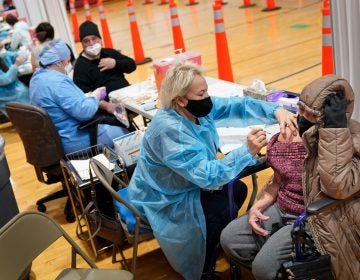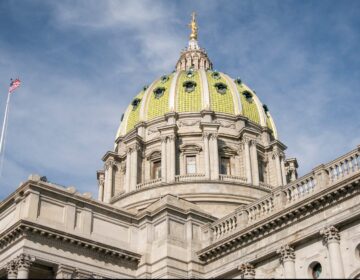After early show of bipartisanship, Pa. lawmakers splinter over next COVID-19 steps
Pennsylvania’s divided Legislature is struggling to agree on how to help the commonwealth recover from coronavirus — and who should get the most aid.
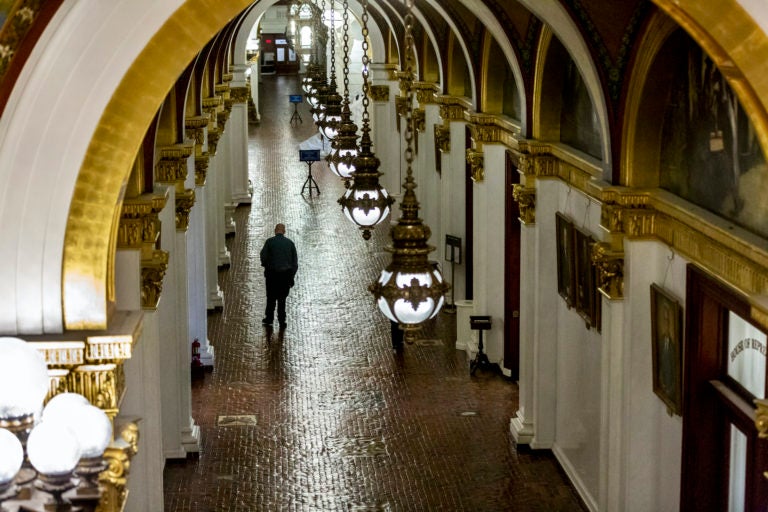
House of Representatives security officer Seamus Smith walks the hall after the morning session on Tuesday, March 24, 2020 in Harrisburg, Pa. (Joe Hermitt/The Patriot-News via AP)
Uncle Bobbie’s Coffee and Books, a small shop in Philadelphia’s Germantown neighborhood, officially closed down on March 16.
Store manager Justin Moore has technically been unemployed since then. But he said in the last few weeks, he’s actually been putting more work into the store than ever.
“I just pretty much started finding resources, finding different ways that we could try to … help support the employees — following up on the new unemployment regulations, different grants and loans … We did start a GoFundMe,” he said.
In that time, Moore has racked up a number of concerns. His workers are struggling to make headway in Pennsylvania’s overloaded unemployment compensation system. He’s trying to sort through piles of online information to figure out whether Uncle Bobbie’s is eligible for government assistance. He’s concerned about the store’s team staying healthy in a big, crowded city.

It so happens, state lawmakers are also trying to address those problems.
As coronavirus cases mounted in Pennsylvania, Republicans and Democrats made a rare show of unity — voting to allow remote sessions, push back the state’s primary and authorize $50 million for medical equipment.
But the next steps forward are less clear, and in the quest to strike a balance between preserving health and preserving the economy, divisions are already forming — between a mostly Democratic, urban faction focused on individual relief, and a more Republican, rural group hoping to get some people back to work.
“I’ve begun to really urge my colleagues, and to urge the governor to … develop a plan to outline in a transparent way clear benchmarks to both protect public health … and to be able to roll back economic restrictions,” Sen. Ryan Aument said Tuesday from his Lancaster County district, where he’s been voting from home.
Aument, a high-ranking Republican, said he’s striving for a measured approach. That’s one reason he wants to put together a bipartisan, inter-branch task force before making too many big decisions.
But he noted there are a couple of areas where he and other GOP leaders want to move more quickly. For one, he thinks many construction companies should keep operating, despite Democratic Gov. Tom Wolf’s order for most of them to shut down. And he said he wants more clarity and consistency for business owners who want waivers to stay open.
“It does appear there’s some inconsistency with what’s permitted in Pennsylvania as compared to neighboring states, and what the federal Department of Homeland Security has classified as essential infrastructure,” he said.
Aument is thinking of people like Matt Stuckey.
Stuckey owns three car dealerships and a collision center in Blair County. His shops are still legally doing repairs since they’re considered essential. But the state has ordered car sales to stop, and Stuckey, who noted that his relatively rural county hasn’t seen many COVID-19 cases, said he’s struggling with the logic of the decision.
“I understand these are not normal times,” he said. “We’re not asking for business as usual … but we feel like in our case, of all retail that is still going, we can really have a very safe, clean, controlled process and help people buy cars.”
Other Republicans want to loosen regulations more than Aument does — and faster. House GOP leaders, for instance, recently started moving a bill that would let any business keep operating if it allows only one worker and one customer inside at a time.
Democrats broadly oppose that idea, arguing it’s unsafe.
Sen. Art Haywood, who represents parts of North Philly and Montgomery County, said while he wants to help businesses, he and many of his colleagues have been more focused on thinking ahead to what their low-income constituents will need when lockdowns start to lift.
“That would include eviction defense and forbearance, foreclosure relief [and] making sure that we have some kind of jobs program that comes out of this that deals with these areas of high concentration of poverty,” he said.
Another Philly Democrat, House Representative Malcolm Kenyatta, said he has been thinking a lot about a recent study on disaster outcomes.
It showed that whiter, more affluent communities generally fared better than low-income communities with lots of Black, Latino or Asian residents — like, for instance, Kenyatta’s North Philadelphia district.
“I just think you have folks who are already in a precarious economic position, which is now being magnified exponentially by this COVID-19 crisis,” he said.
As for Justin Moore, and Uncle Bobbie’s Coffee and Books? His needs don’t necessarily align with a single approach.
He wants clarity on when his workers will get their unemployment benefits. He wants a clearer source of information from the government on what resources are available to his business. And he doesn’t want to go back to work yet — even on a limited basis.
“My employees don’t necessarily have the luxury to not work, so they would be making the very, very difficult decision if I say, ‘Hey, we opened up, you can work these hours if you want,’” he said. “There are definitely people who would say, ‘I don’t want to go because I’m a little nervous, but I need to earn this money, so let me do that.’”
COVID-19 cases are still rising in Pennsylvania, though the state Health Department said the peak may come sometime this week or next.
Whenever that does happen, the state will have a new issue on its hands: a shortage of cash to pay for recovery programs.
Lawmakers say this year alone, they expect the state budget could be up to $5 billion short of balanced — and next year, the deficit could be even higher.
WHYY is your source for fact-based, in-depth journalism and information. As a nonprofit organization, we rely on financial support from readers like you. Please give today.



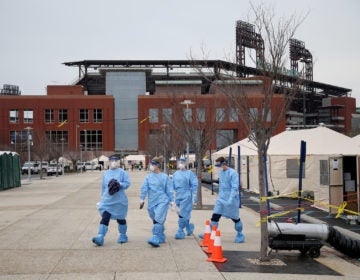
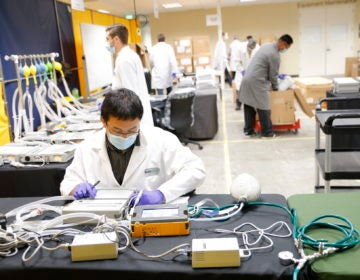
![CoronavirusPandemic_1024x512[1]](https://whyy.org/wp-content/uploads/2020/03/CoronavirusPandemic_1024x5121-300x150.jpg)
